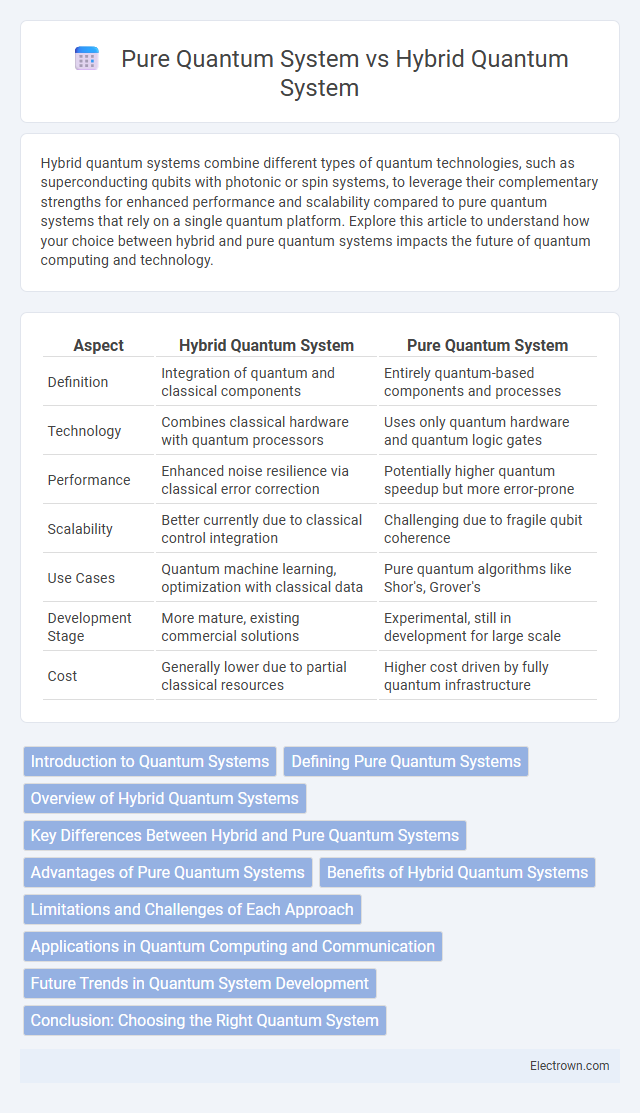Hybrid quantum systems combine different types of quantum technologies, such as superconducting qubits with photonic or spin systems, to leverage their complementary strengths for enhanced performance and scalability compared to pure quantum systems that rely on a single quantum platform. Explore this article to understand how your choice between hybrid and pure quantum systems impacts the future of quantum computing and technology.
Table of Comparison
| Aspect | Hybrid Quantum System | Pure Quantum System |
|---|---|---|
| Definition | Integration of quantum and classical components | Entirely quantum-based components and processes |
| Technology | Combines classical hardware with quantum processors | Uses only quantum hardware and quantum logic gates |
| Performance | Enhanced noise resilience via classical error correction | Potentially higher quantum speedup but more error-prone |
| Scalability | Better currently due to classical control integration | Challenging due to fragile qubit coherence |
| Use Cases | Quantum machine learning, optimization with classical data | Pure quantum algorithms like Shor's, Grover's |
| Development Stage | More mature, existing commercial solutions | Experimental, still in development for large scale |
| Cost | Generally lower due to partial classical resources | Higher cost driven by fully quantum infrastructure |
Introduction to Quantum Systems
Quantum systems encompass both pure quantum systems, which rely solely on quantum mechanical properties such as superposition and entanglement, and hybrid quantum systems that integrate classical components to enhance control and scalability. Pure quantum systems excel in fundamental quantum phenomena and coherent operations but often face challenges in practical implementation due to decoherence and noise. Your understanding of quantum systems benefits from recognizing how hybrid configurations leverage classical interfaces to improve stability and operational reliability while maintaining quantum advantages.
Defining Pure Quantum Systems
Pure quantum systems consist solely of quantum components that exhibit superposition, entanglement, and coherence without classical interference. These systems operate entirely within the quantum regime, enabling precise manipulation of quantum states for computing and communication. Understanding the behavior of pure quantum systems is essential for advancing quantum algorithms and error correction methods that underpin your quantum technology development.
Overview of Hybrid Quantum Systems
Hybrid quantum systems integrate different quantum platforms, such as superconducting qubits coupled with spin ensembles or mechanical resonators, to leverage diverse advantages like longer coherence times and stronger interactions. These systems enhance scalability and functionality compared to pure quantum systems, which rely on a single type of quantum element, often limited by specific decoherence mechanisms. The development of hybrid architectures accelerates progress in quantum sensing, communication, and information processing due to their versatile coupling and control capabilities.
Key Differences Between Hybrid and Pure Quantum Systems
Hybrid quantum systems combine different quantum platforms, such as superconducting qubits integrated with spin systems, to leverage their unique advantages like longer coherence times and faster gate operations. Pure quantum systems rely on a single type of quantum technology, offering simpler architecture but potentially limited scalability and versatility. Your choice depends on whether you prioritize system complexity or enhanced functionality for specific quantum computing tasks.
Advantages of Pure Quantum Systems
Pure quantum systems provide unparalleled coherence times and minimize decoherence effects, ensuring higher fidelity in quantum computations and experiments. Their intrinsic isolation from classical environments enhances quantum state stability, essential for precise quantum manipulation and error correction. You benefit from the enhanced accuracy and reliability of pure quantum systems in advanced quantum technologies and research applications.
Benefits of Hybrid Quantum Systems
Hybrid quantum systems combine the strengths of different quantum technologies, enhancing coherence times and operational flexibility compared to pure quantum systems. They enable efficient integration of quantum memories with fast quantum processors, improving overall performance in quantum communication and computation tasks. These systems also facilitate scalable architectures by leveraging diverse physical platforms, ultimately advancing practical quantum applications.
Limitations and Challenges of Each Approach
Hybrid quantum systems face challenges related to integrating disparate quantum components, leading to issues with coherence times and interface compatibility. Pure quantum systems struggle with scalability and error rates due to the fragile nature of quantum states and the difficulty of maintaining entanglement over extended circuits. Your choice between these approaches depends on balancing the trade-offs between robustness in hybrid setups and the precision but vulnerability in pure quantum architectures.
Applications in Quantum Computing and Communication
Hybrid quantum systems combine different quantum platforms, such as superconducting qubits with photonic or spin systems, to leverage their unique strengths, enhancing quantum computing scalability and communication efficiency. Pure quantum systems, like isolated superconducting qubits or trapped ions, offer high coherence times and gate fidelities but face challenges in integration and long-distance communication. Your choice between hybrid and pure quantum systems impacts the robustness and versatility of quantum networks and computational architectures, tailoring solutions to specific quantum information processing tasks.
Future Trends in Quantum System Development
Hybrid quantum systems integrate different physical qubits, such as superconducting circuits and trapped ions, enabling enhanced coherence times and scalability compared to pure quantum systems limited to a single qubit architecture. Future trends emphasize the development of error correction protocols and quantum network interoperability to harness the strengths of diverse quantum platforms for practical applications. Your ability to exploit hybrid quantum systems could accelerate breakthroughs in quantum computing, communication, and sensing.
Conclusion: Choosing the Right Quantum System
Selecting the right quantum system depends on your specific application needs, balancing the coherence advantages of pure quantum systems with the versatility and integration benefits of hybrid quantum systems. Hybrid systems combine different quantum platforms to optimize scalability and functionality, while pure quantum systems often offer more stability and simpler error correction. Considering factors like hardware complexity, environmental noise, and desired computational tasks will guide you to the most efficient choice for your quantum technology goals.
hybrid quantum system vs pure quantum system Infographic

 electrown.com
electrown.com